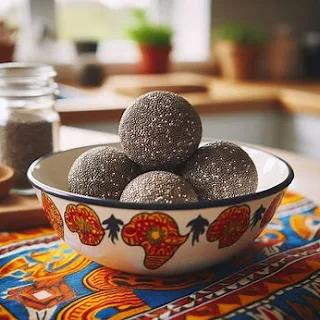How to Make Chia Seed Rolled Dates for a Healthy African Snack
Dates have a naturally sweet, caramel-like flavor and a soft, chewy texture, making them a delicious and satisfying treat. Chia seeds, on the other hand, are mostly tasteless but have a slight nutty flavor and a fun, crunchy texture.
 |
| Chia Seed Rolled Dates |
When you combine these two, you get a snack that’s sweet and chewy with a delightful crunch. This combo is much healthier than a candy bar because dates are full of fiber and natural sugars that give you energy without a crash, and chia seeds are packed with protein and omega-3 fatty acids that are great for your body.
Dates and chia seeds are both important crops in Africa for several reasons. Dates have been a staple food in North Africa and the Middle East for thousands of years. They grow on
date palm trees, which thrive in the hot, dry climates of countries like Egypt, Algeria, and Morocco.
These African countries are a few of the highest producers of dates in the world. Dates are not only delicious and nutritious fruit but also a significant part of the local economy and culture. They are used in traditional dishes and during important celebrations and festivals.
Chia seeds, originally grown in Central and South America, have also become an important crop in Africa. Countries like Kenya and Uganda are now among the leading producers of chia seeds. Chia plants grow well in the warm climates found in many African regions.
Chia seeds have a long history, originally cultivated by the ancient Aztecs and Mayans in Central and South America as a vital source of nutrition and energy. Having healthy snacks like this ready to go helps you avoid reaching for sugary, unhealthy options when you need a quick energy boost.
 |
| Chia Seed Rolled Dates |
Chia Seed Rolled Dates African Snack Recipe
Ingredients
1 cup pitted dates
1/2 cup chia seeds
1/4 cup desiccated coconut
1/4 cup chopped nuts (peanuts, almonds, walnuts, or pistachios)
Directions
A note about the dates, if the dates are too dry, soak them in warm water for about 10 minutes to soften them. Drain the water thoroughly. Place the pitted dates in a food processor.
Blend until they form a smooth, sticky paste. Take a small amount of the date paste (about a tablespoon) and roll it into a ball using your hands.
Roll each date ball in chia seeds until it is fully coated. Press gently to ensure the chia seeds stick well. You can also roll the date balls in desiccated coconut or chopped nuts for added texture and flavor.
Place the chia seed rolled dates in an airtight container. They can be stored at room temperature for a few days or in the refrigerator for up to two weeks.
Dates and Chia Seeds
Date trees were introduced to Africa thousands of years ago through trade and migration from the Middle East, where they were already a staple crop, and they thrived in the similar hot, arid climates of North African regions such as Egypt, Algeria, and Morocco.
Chia seeds were introduced to Africa through agricultural research and trade in recent decades, as their high nutritional value and adaptability to various climates were recognized, leading to their cultivation in countries like Kenya and Uganda.
- Veggie Okra Stew
- Rice Bread
- Muamba Chicken Stew and Funge
- What Is Fufu and Ugali
- How to Cook Ostrich Meat





























